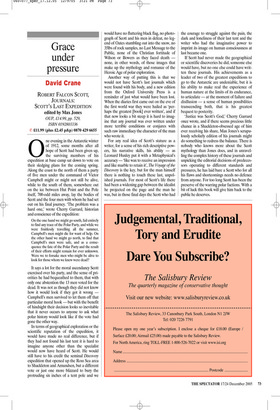Grace under pressure
David Crane
ROBERT FALCON SCOTT, JOURNALS: SCOTT’S LAST EXPEDITION edited by Max Jones OUP, £14.99, pp. 529, ISBN 0192803336 ✆ £11.99 (plus £2.45 p&p) 0870 429 6655 One evening in the Antarctic winter of 1912, some months after all hope of Scott had been given up, the surviving members of his expedition at base camp sat down to vote on their sledging plans for the coming spring. Along the coast to the north of them a party of five men under the command of Victor Campbell might or might not still be alive, while to the south of them, somewhere out on the ice between Hut Point and the Pole itself, 700-odd miles away, lay the bodies of Scott and the four men with whom he had set out on his final journey. ‘The problem was a hard one,’ wrote Cherry Garrard, historian and conscience of the expedition:
On the one hand we might go south, fail entirely to find any trace of the Polar Party, and while we were fruitlessly travelling all the summer, Campbell’s men might die for want of help. On the other hand we might go north, to find that Campbell’s men were safe, and as a consequence the fate of the Polar Party and the result of their efforts might remain for ever unknown. Were we to forsake men who might be alive to look for those whom we knew were dead?
It says a lot for the moral ascendancy Scott exercised over his party, and the sense of priorities he had bequeathed to them, that with only one abstention the 13 men voted for the dead. It was not as though they did not know how it would look if they got it wrong — Campbell’s men survived to let them off that particular moral hook — but with the benefit of hindsight their decision looks so inevitable that it never occurs to anyone to ask what polar history would look like if the vote had gone the other way.
In terms of geographical exploration or the scientific reputation of the expedition, it would have made no real difference, but if they had not found his last tent it is hard to imagine anyone other than the specialist would now have heard of Scott. He would still have to his credit the seminal Discovery expedition that opened up the Ross Sea area to Shackleton and Amundsen, but a different vote or just one more blizzard to bury the protruding six inches of a tent pole and we would have no fluttering black flag, no photograph of Scott and his men in defeat, no legend of Oates stumbling out into the snow, no 35lbs of rock samples, no Last Message to the Public, none of the Christian fortitude of Wilson or Bowers as they faced death none, in other words, of those images that make up the mythology and romance of the Heroic Age of polar exploration.
Another way of putting this is that we would not have Scott’s last journals which were found with his body, and a new edition from the Oxford University Press is a reminder of just what would have been lost. When the diaries first came out on the eve of the first world war they were hailed as ‘perhaps the greatest [book] ever written’, and if that now looks a bit steep it is hard to imagine that any journal was ever written under more terrible conditions or conjures with such raw immediacy the character of the man who wrote it.
For any real idea of Scott’s stature as a writer, for a sense of his rich descriptive powers, his narrative skills, his ability — as Leonard Huxley put it with a Metaphysical’s accuracy — ‘like wax to receive an impression and like marble to retain it’, The Voyage of the Discovery is the key, but for the man himself there is nothing to touch these last, unpolished journals. For most of Scott’s life there had been a widening gap between the idealist he projected on the page and the man he was, but in those final days the Scott who had the courage to struggle against the pain, the dark and loneliness of their last tent and the writer who had the imaginative power to imprint its image on human consciousness at last became one.
If Scott had never made the geographical or scientific discoveries he did, someone else would have, but no one else could have written these journals. His achievements as a leader of two of the greatest expeditions to go to the Antarctic are undeniable, but it is his ability to make real the experience of human nature at the limits of its endurance, to articulate — at the moment of failure and disillusion — a sense of human possibilities transcending both, that is his greatest bequest to posterity.
‘Justice was Scott’s God,’ Cherry Garrard once wrote, and if there seems precious little chance in a Shackleton-obsessed age of him ever receiving his share, Max Jones’s scrupulously scholarly edition of his journals might do something to redress the balance. There is nobody who knows more about the Scott mythology than Jones does, and in unravelling the complex history of these journals and unpicking the editorial decisions of predecessors operating to different standards and pressures, he has laid bare a Scott who for all his flaws and shortcomings needs no defence from anyone. For too long Scott has been the preserve of the warring polar factions. With a bit of luck this book will give him back to the public he deserves.


















































































 Previous page
Previous page